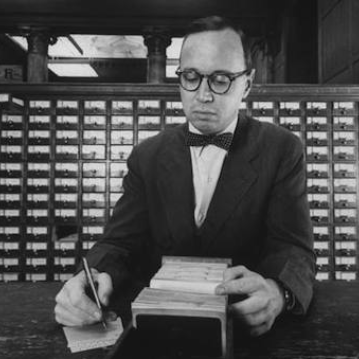On this site, you can search The New York Public Library's vast holdings, initiate a research visit, submit a query to an archivist, and access digitized material.
Learn more.
Made possible with generous support from The Robert W. Wilson Charitable Trust, The Polonsky Foundation, and The Hermione Foundation.
Arthur M. Schlesinger, Jr. (1917-2007) was an American historian as renowned for his political activities as a liberal Democrat as for his critically acclaimed scholarly work. He won the Pulitzer Prize and National Book Award twice each, while playing a significant role in shaping the intellectual basis of postwar Democratic liberalism.
He was born Arthur Bancroft Schlesinger on October 15, 1917 to Arthur Meier Schlesinger and Elizabeth Bancroft Schlesinger, both well-known historians. Elizabeth was distantly related to historian George Bancroft. Born in Ohio, Schlesinger moved to Cambridge, Massachusetts when his father became a professor of history at Harvard University. Schlesinger changed his middle name to Meier when he was a teenager so as to share a name with his father. Graduating from Harvard University in 1938, Schlesinger eventually published his senior thesis on nineteenth-century theologian and activist Orestes Brownson. He studied at Cambridge University for a year, and then returned to Harvard as a research fellow, where he wrote The Age of Jackson (1945), which won him his first Pulitzer Prize. During World War II, he worked in the Office of War Information and the Office of Strategic Services, a forerunner of the Central Intelligence Agency. In 1946, he returned to Harvard as an assistant professor of history. Despite not having a doctorate, Schlesinger had completed Harvard's own research fellowship program, and his academic career was never adversely affected by his choice not to pursue a doctoral degree. Schlesinger helped found the Americans for Democratic Action (ADA), a leading anti-Communist liberal group, in 1947.
Active in Democratic Party politics in Massachusetts, as well as at the national level, Schlesinger was heavily involved in Averell Harriman's campaign for the 1952 Democratic presidential nomination. When Harriman left the race, Schlesinger offered his services to Adlai Stevenson, forging a friendship and political alliance that would last for many years. Schlesinger wrote speeches, made appearances, and provided political advice to Stevenson in both his 1952 and 1956 presidential campaigns. Once sure that Stevenson was not planning to run for the office in 1960, Schlesinger aligned himself with Senator John F. Kennedy, a friend from Massachusetts. After helping to elect Kennedy in 1960, Schlesinger was appointed a special assistant to the President in 1961. He took an extended leave of absence from Harvard University to join the Kennedy Administration, where he worked as a problem solver, Latin American expert, and unofficial liaison to the academic community. Initially under the impression that Kennedy did not intend him to write the history of his presidency, Schlesinger later felt that he was expected to keep detailed notes on what he saw and heard. After President Kennedy's assassination, Schlesinger stayed on briefly during the transitional period of the Johnson Administration. He left the White House in early 1964, never to return to full-time work in the political realm. He did, however, serve as a speechwriter and advisor in the presidential campaigns of Robert F. Kennedy in 1968 and George S. McGovern in 1972. His final active role in a political campaign was with Senator Edward M. Kennedy in his quest for the Democratic presidential nomination in 1980, although he did provide advice to Bill Clinton and Al Gore during their presidential campaigns.
His account of the Kennedy White House, A Thousand Days (1965), won him his second Pulitzer Prize. Among his other important historical works are the three-volume history of the New Deal, The Age of Roosevelt (1957-1960); The Imperial Presidency (1973); Robert F. Kennedy and His Times (1978), for which he won the National Book Award; The Cycles of American History (1986); The Disuniting of America (1992) and his memoir A Life in the 20th Century: Innocent Beginnings, 1917-1950 (2000). He always hoped to continue the Age of Roosevelt series after his service in Washington, but never wrote the planned fourth volume.
Schlesinger became the Albert Schweitzer Professor of Humanities at the City University of New York in 1966. He settled in Manhattan, where he remained until his death, sharing a fence with neighbor Richard M. Nixon at one point. During his years in New York he led a remarkably active social and political life, associating and collaborating with a broad range of academic, political, and cultural figures, while continuing to articulate his distinctive and historically-informed opinions through books, articles, book and movie reviews, lectures and speeches, petitions, and newspaper editorials.
Schlesinger married twice and had six children. His first marriage, to Marian Cannon, ended in divorce in 1969, and his second marriage, to Alexandra Emmet, lasted until his death in 2007the end of his life. He had two sons and two daughters from his first marriage, and a son and stepson from his second.
Collections
Described Components
Feet of Documents
Names
Digitized Pages
Collections Added this Year
-
Lou Reed papers D... date from 1958 to 2015, and follow Reed's music career from the formation of the Velvet Underground, through his five-decade long career as a solo rock and roll musician. The colle...
-
Sonny Rollins papers..., dating from the 1910s to 2015 (the bulk dates from the 1950s onward) document the musical, personal, and career development of one of the most important musicians and artists...
-
James Baldwin papers DThe James Baldwin Papers document Baldwin's career as an African American writer, intellectual, and activist in the United States and abroad...
-
List of loyalists against whom judgments were given under the Confiscation Act D
-
Thomas Kelah Wharton diaries and sketchbook D
